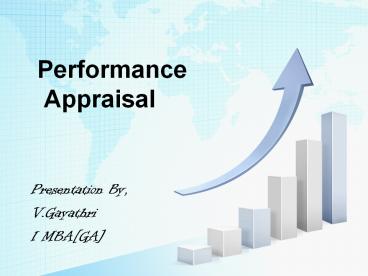Performance Appraisal - PowerPoint PPT Presentation
Title:
Performance Appraisal
Description:
Appraisal process,methods with illustrations. – PowerPoint PPT presentation
Number of Views:60307
Title: Performance Appraisal
1
Performance Appraisal
- Presentation By,
- V.Gayathri
- I MBAGA
2
What is Performance Appraisal
- It is the process by which organization evaluate
employee job performance. - It is a process that involves determining and
communicating to an employee how he or she is
performing the job and ideally establishing a
plan of improvement. - It is a systematic and objective way of
evaluating both work-related behaviour and
potential of employees.
3
Difference between PM and PA
Processes used to identify, encourage,
measure,evaluate, improve, and reward employee
performance.
The process of evaluatinghow well employees
perform their jobs and then communicating that
information to the employees.
4
Objectives
5
Benefits of Performance Appraisal
6
Who conducts appraisal?
7
(No Transcript)
8
Appraisal Factors used in A.C.C. ltd
- Organising ability
- Loyalty
- Initiative
- Ability to communicate
- Judgement
- Ability to take decisions
- Leadership
- Employee relation -ship
- Delegation
- Ability to run meetings
9
(No Transcript)
10
Performance Appraisal Process
11
Performance Appraisal Methods
12
Graphic Rating Scale
13
Category Rating Method(contd..)
- Checklists
- A performance appraisal tool that uses a list of
statements or work behaviors that are checked by
raters. - Can be quantified by applying weights to
individual checklist items. - Drawbacks
- Interpretation of item meanings by raters
- Weighting creates problems in appraisal
interpretation
14
Comparative methods
- Ranking
- A listing of all employees from highest to lowest
in performance. - Drawbacks
- Does not show size of differences in performance
between employees - Implies that lowest-ranked employees are
unsatisfactory performers. - Becomes an unwieldy process if the group to be
ranked is large.
15
(No Transcript)
16
Comparative methods(contd)
- Forced Distribution
- Performance appraisal method in which ratings of
employees are distributed along a bell-shaped
curve. - Drawbacks
- Assumes a normal distribution of performance.
- Providing explanation for placement in a higher
or lower grouping can be difficult. - Is not readily applicable to small groups of
employees.
17
(No Transcript)
18
Narrative Methods
- Critical Incident
- Manager keeps a written record of highly
favorable and unfavorable employee actions. - Drawbacks
- Variations in how managers define a critical
incident - Time involved in documenting employee actions
- Most employee actions are not observed and may
become different if observed
19
Narrative Methods(contd..)
- Essay
- Manager writes a short essay describing an
employees performance. - Drawback
- Depends on the managers writing skills and their
ability to express themselves.
20
Behavioral /Objective methods
- Behavioral Rating Approach
- Assesses employees behaviors instead of other
characteristics - Consists of a series of scales created by
- Identifying important job dimensions
- Creating statements describing a range of desired
and undesirable behaviors (anchors) - Type of behavioral scale
- Behaviorally anchored rating scales (BARS)
21
(No Transcript)
22
Behavioral /Objective methods
- Management by Objectives
- Specifying the performance goals that an
individual and his or her manager agree the
employee will to try to attain within an
appropriate length of time. - Key MBO Ideas
- Employee involvement creates higher levels of
commitment and performance. - Encourages employees to work effectively toward
achieving desired results. - Performance measures should be measurable and
should define results.
23
360 Feed Back System
- A system of collecting performance information
from multiple parties. - Multiple parties include ones subordinates
peers,supervisors and customers - It is also used to design promotion and reward.
24
Problems with Performance Appraisal
- First impressions
- Halo
- Horn Effect
- Leniency
- Stereotyping
- Recent Effect
25
(No Transcript)































